Dacia Spring vs Hyundai Santa Fe – Performance, range & efficiency compared
Everyday use, family trips or long-distance drives – here’s where the differences show.
Discover whether Dacia Spring or Hyundai Santa Fe fits your lifestyle better.
Costs and Efficiency:
Price and efficiency are often the first things buyers look at. Here it becomes clear which model has the long-term edge – whether at the pump, the plug, or in purchase price.
Dacia Spring has a clearly advantage in terms of price – it starts at 14500 £, while the Hyundai Santa Fe costs 51200 £. That’s a price difference of around 36729 £.
As for range, the Dacia Spring performs convincingly better – achieving up to 228 km, about 174 km more than the Hyundai Santa Fe.
Engine and Performance:
Power, torque and acceleration are the classic benchmarks for car enthusiasts – and here, some clear differences start to show.
When it comes to engine power, the Hyundai Santa Fe has a decisively edge – offering 253 HP compared to 65 HP. That’s roughly 188 HP more horsepower.
In acceleration from 0 to 100 km/h, the Hyundai Santa Fe is convincingly quicker – completing the sprint in 9 s, while the Dacia Spring takes 13.70 s. That’s about 4.70 s faster.
In terms of top speed, the Hyundai Santa Fe performs clearly perceptible better – reaching 196 km/h, while the Dacia Spring tops out at 125 km/h. The difference is around 71 km/h.
There’s also a difference in torque: Hyundai Santa Fe pulls significantly stronger with 380 Nm compared to 125 Nm. That’s about 255 Nm difference.
Space and Everyday Use:
Cabin size, boot volume and payload all play a role in everyday practicality. Here, comfort and flexibility make the difference.
Seats: Hyundai Santa Fe offers significantly more seating capacity – 7 vs 4.
In curb weight, Dacia Spring is clearly lighter – 1013 kg compared to 1920 kg. The difference is around 907 kg.
In terms of boot space, the Hyundai Santa Fe offers convincingly more room – 711 L compared to 308 L. That’s a difference of about 403 L.
In maximum load capacity, the Hyundai Santa Fe performs significantly better – up to 2032 L, which is about 1028 L more than the Dacia Spring.
When it comes to payload, Hyundai Santa Fe convincingly takes the win – 665 kg compared to 302 kg. That’s a difference of about 363 kg.
Who wins the race?
The Hyundai Santa Fe proves to be leaves the rival little chance and therefore becomes our DriveDuel Champion!
Hyundai Santa Fe is the better all-rounder in this comparison.
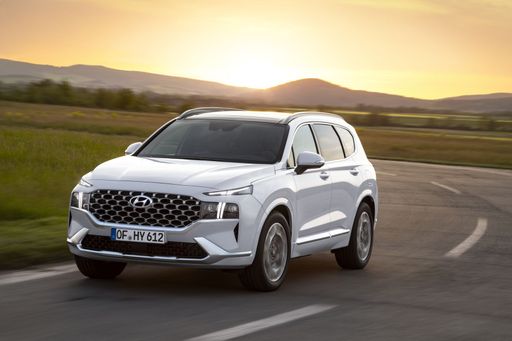 @ hyundai.news
@ hyundai.news
Hyundai Santa Fe
Dacia Spring
The Dacia Spring stands out as an affordable and environmentally friendly option in the electric vehicle market, combining practicality with a compact design ideal for urban settings. Its minimalist interior, while basic, provides all the essential features needed for a comfortable drive, reflecting its cost-effective approach. The vehicle's performance suits city driving, making it an appealing choice for those seeking an entry-level electric car.
details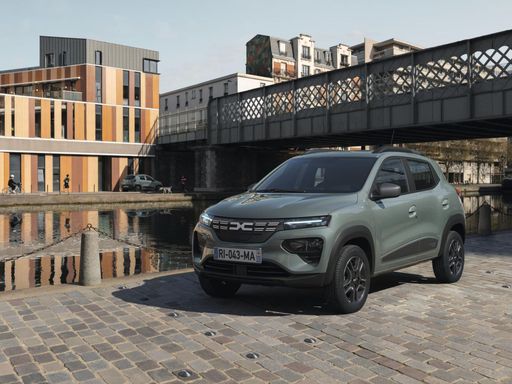 @ dacia-presse.de
@ dacia-presse.de
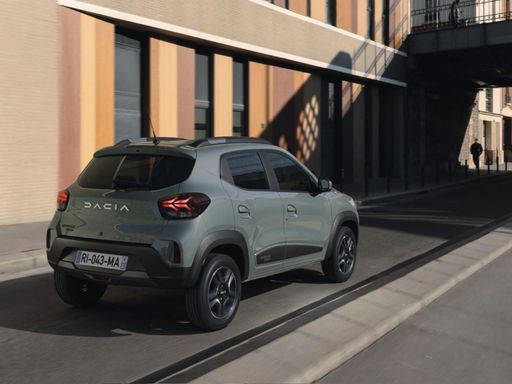 @ dacia-presse.de
@ dacia-presse.de
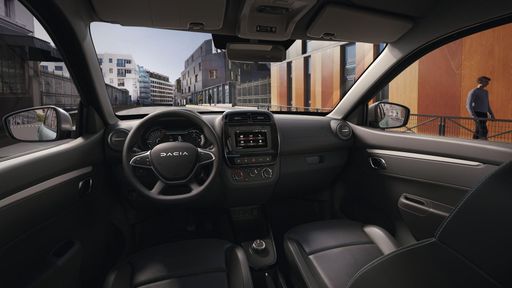 @ dacia-presse.de
@ dacia-presse.de
Hyundai Santa Fe
The Hyundai Santa Fe offers a refined blend of style and functionality, making it a strong contender in the SUV market. Its modern interior, combined with advanced technology and comfort features, creates an inviting and practical driving environment. With its sleek design and robust performance, the Santa Fe is well-suited for both urban commutes and family adventures.
details @ hyundai.news
@ hyundai.news
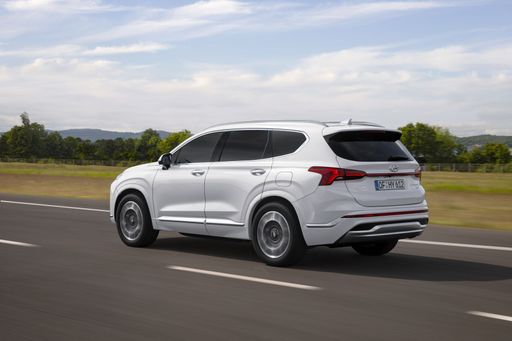 @ hyundai.news
@ hyundai.news
 @ hyundai.news
@ hyundai.news
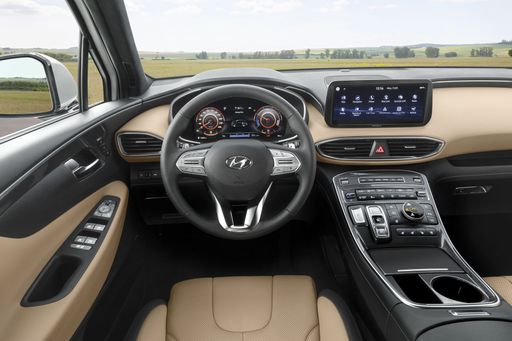 @ hyundai.news
@ hyundai.news
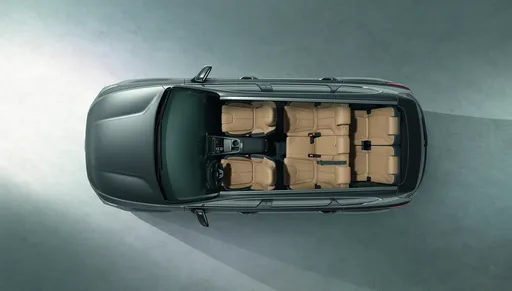 @ hyundai.news
@ hyundai.news
 @ dacia-presse.de
@ dacia-presse.de
|
 @ hyundai.news
@ hyundai.news
|
|
|
|
Costs and Consumption |
|
|---|---|
|
Price
14500 - 17100 £
|
Price
51200 - 58400 £
|
|
Consumption L/100km
-
|
Consumption L/100km
1.7 - 7.1 L
|
|
Consumption kWh/100km
13.2 - 14.1 kWh
|
Consumption kWh/100km
-
|
|
Electric Range
225 - 228 km
|
Electric Range
54 km
|
|
Battery Capacity
26.80 kWh
|
Battery Capacity
-
|
|
co2
0 g/km
|
co2
38 - 160 g/km
|
|
Fuel tank capacity
-
|
Fuel tank capacity
47 - 67 L
|
Dimensions and Body |
|
|---|---|
|
Body Type
SUV
|
Body Type
SUV
|
|
Seats
4
|
Seats
5 - 7
|
|
Doors
5
|
Doors
5
|
|
Curb weight
1013 - 1050 kg
|
Curb weight
1920 - 2165 kg
|
|
Trunk capacity
308 L
|
Trunk capacity
621 - 711 L
|
|
Length
3701 mm
|
Length
4830 mm
|
|
Width
1583 mm
|
Width
1900 mm
|
|
Height
1519 mm
|
Height
1720 mm
|
|
Max trunk capacity
1004 L
|
Max trunk capacity
1942 - 2032 L
|
|
Payload
265 - 302 kg
|
Payload
560 - 665 kg
|
Engine and Performance |
|
|---|---|
|
Engine Type
Electric
|
Engine Type
Plugin Hybrid, Full Hybrid
|
|
Transmission
Automatic
|
Transmission
Automatic
|
|
Transmission Detail
Reduction Gearbox
|
Transmission Detail
Automatic Gearbox
|
|
Drive Type
Front-Wheel Drive
|
Drive Type
All-Wheel Drive, Front-Wheel Drive
|
|
Power HP
44 - 65 HP
|
Power HP
239 - 253 HP
|
|
Acceleration 0-100km/h
13.7 - 19.1 s
|
Acceleration 0-100km/h
9 - 9.3 s
|
|
Max Speed
125 km/h
|
Max Speed
180 - 196 km/h
|
|
Torque
113 - 125 Nm
|
Torque
367 - 380 Nm
|
|
Number of Cylinders
-
|
Number of Cylinders
4
|
|
Power kW
33 - 48 kW
|
Power kW
176 - 186 kW
|
|
Engine capacity
-
|
Engine capacity
1598 cm3
|
General |
|
|---|---|
|
Model Year
2024
|
Model Year
2024 - 2025
|
|
CO2 Efficiency Class
A
|
CO2 Efficiency Class
B, E, F
|
|
Brand
Dacia
|
Brand
Hyundai
|
What drive types are available for the Dacia Spring?
The Dacia Spring is available as Front-Wheel Drive.
The prices and data displayed are estimates based on German list prices and may vary by country. This information is not legally binding.
